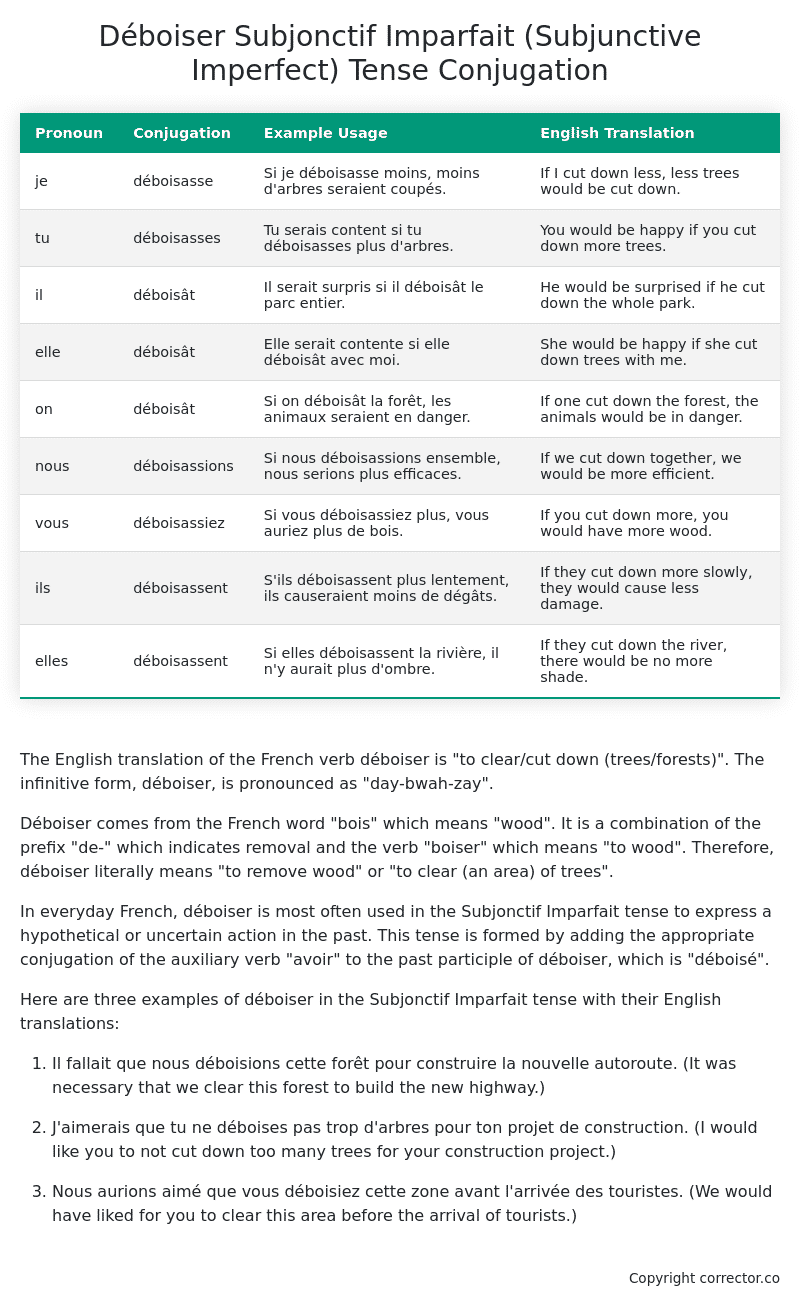Subjonctif Imparfait (Subjunctive Imperfect) Tense Conjugation of the French Verb déboiser
Introduction to the verb déboiser
The English translation of the French verb déboiser is “to clear/cut down (trees/forests)”. The infinitive form, déboiser, is pronounced as “day-bwah-zay”.
Déboiser comes from the French word “bois” which means “wood”. It is a combination of the prefix “de-” which indicates removal and the verb “boiser” which means “to wood”. Therefore, déboiser literally means “to remove wood” or “to clear (an area) of trees”.
In everyday French, déboiser is most often used in the Subjonctif Imparfait tense to express a hypothetical or uncertain action in the past. This tense is formed by adding the appropriate conjugation of the auxiliary verb “avoir” to the past participle of déboiser, which is “déboisé”.
Here are three examples of déboiser in the Subjonctif Imparfait tense with their English translations:
-
Il fallait que nous déboisions cette forêt pour construire la nouvelle autoroute.
(It was necessary that we clear this forest to build the new highway.) -
J’aimerais que tu ne déboises pas trop d’arbres pour ton projet de construction.
(I would like you to not cut down too many trees for your construction project.) -
Nous aurions aimé que vous déboisiez cette zone avant l’arrivée des touristes.
(We would have liked for you to clear this area before the arrival of tourists.)
Table of the Subjonctif Imparfait (Subjunctive Imperfect) Tense Conjugation of déboiser
| Pronoun | Conjugation | Example Usage | English Translation |
|---|---|---|---|
| je | déboisasse | Si je déboisasse moins, moins d’arbres seraient coupés. | If I cut down less, less trees would be cut down. |
| tu | déboisasses | Tu serais content si tu déboisasses plus d’arbres. | You would be happy if you cut down more trees. |
| il | déboisât | Il serait surpris si il déboisât le parc entier. | He would be surprised if he cut down the whole park. |
| elle | déboisât | Elle serait contente si elle déboisât avec moi. | She would be happy if she cut down trees with me. |
| on | déboisât | Si on déboisât la forêt, les animaux seraient en danger. | If one cut down the forest, the animals would be in danger. |
| nous | déboisassions | Si nous déboisassions ensemble, nous serions plus efficaces. | If we cut down together, we would be more efficient. |
| vous | déboisassiez | Si vous déboisassiez plus, vous auriez plus de bois. | If you cut down more, you would have more wood. |
| ils | déboisassent | S’ils déboisassent plus lentement, ils causeraient moins de dégâts. | If they cut down more slowly, they would cause less damage. |
| elles | déboisassent | Si elles déboisassent la rivière, il n’y aurait plus d’ombre. | If they cut down the river, there would be no more shade. |
Other Conjugations for Déboiser.
Le Present (Present Tense) Conjugation of the French Verb déboiser
Imparfait (Imperfect) Tense Conjugation of the French Verb déboiser
Passé Simple (Simple Past) Tense Conjugation of the French Verb déboiser
Passé Composé (Present Perfect) Tense Conjugation of the French Verb déboiser
Futur Simple (Simple Future) Tense Conjugation of the French Verb déboiser
Futur Proche (Near Future) Tense Conjugation of the French Verb déboiser
Plus-que-parfait (Pluperfect) Tense Conjugation of the French Verb déboiser
Passé Antérieur (Past Anterior) Tense Conjugation of the French Verb déboiser
Futur Antérieur (Future Anterior) Tense Conjugation of the French Verb déboiser
Subjonctif Présent (Subjunctive Present) Tense Conjugation of the French Verb déboiser
Subjonctif Passé (Subjunctive Past) Tense Conjugation of the French Verb déboiser
Subjonctif Imparfait (Subjunctive Imperfect) Tense Conjugation of the French Verb déboiser (this article)
Subjonctif Plus-que-parfait (Subjunctive Pluperfect) Tense Conjugation of the French Verb déboiser
Conditionnel Présent (Conditional Present) Tense Conjugation of the French Verb déboiser
Conditionnel Passé (Conditional Past) Tense Conjugation of the French Verb déboiser
L’impératif Présent (Imperative Present) Tense Conjugation of the French Verb déboiser
L’infinitif Présent (Infinitive Present) Tense Conjugation of the French Verb déboiser
Struggling with French verbs or the language in general? Why not use our free French Grammar Checker – no registration required!
Get a FREE Download Study Sheet of this Conjugation 🔥
Simply right click the image below, click “save image” and get your free reference for the déboiser Subjonctif Imparfait tense conjugation!

Déboiser – About the French Subjonctif Imparfait (Subjunctive Imperfect) Tense
Formation
Common Everyday Usage Patterns
Interactions with Other Tenses
Subjonctif Présent
Indicatif Passé Composé
Conditional
Conditional Perfect
Summary
I hope you enjoyed this article on the verb déboiser. Still in a learning mood? Check out another TOTALLY random French verb conjugation!


